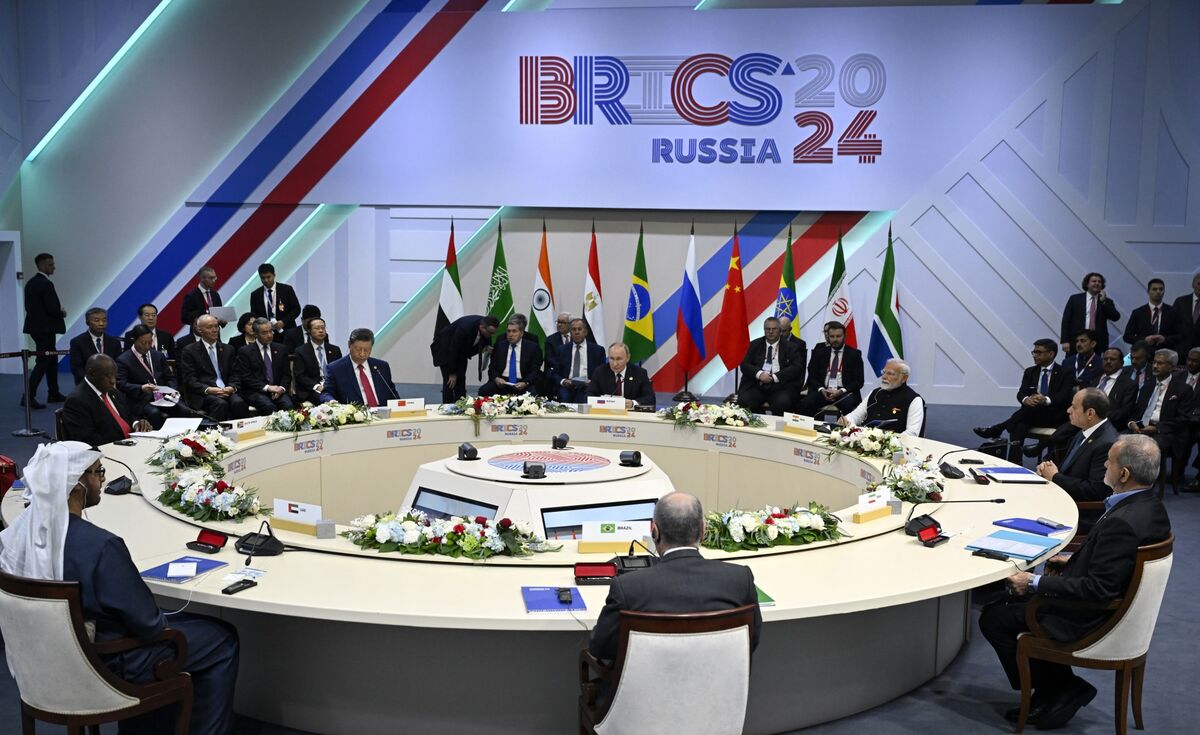cross-posted from: https://lemmy.ml/post/21772522
Indonesia has started the process of becoming part of the BRICS in a sign of growing influence for the group that’s positioned itself as an alternative to the US-led global order.
Southeast Asia’s largest economy expressed its interest in joining the bloc at the BRICS Plus Summit in Kazan, Russia on Thursday, according to newly-appointed Indonesia Foreign Minister Sugiono.
BRICS, led by Brazil, Russia, India, China and South Africa, is the “right vehicle” to advance the interests of the Global South, Sugiono said in a statement. The bloc also backs new Indonesia President Prabowo Subianto’s priorities, including food and energy security, poverty eradication and improving human capital, he added.
“Joining BRICS is a manifestation of Indonesia’s free and active foreign policy,” said Sugiono who goes by one name.
The starting the process to join BRICS marks the first foreign policy move by the Prabowo government. It would be a major win for BRICS should Indonesia join its ranks. Within Southeast Asia alone, Thailand — a US treaty ally — and Malaysia have also expressed interest to join.
In his speech at the BRICS Plus Summit in Kazan, Sugiono underlined Indonesia’s solidarity with Palestine and Lebanon, and reiterated calls for a ceasefire. “Indonesia cannot remain silent while these atrocities continue without anyone being held accountable,” he said.
The worsening conflict in the Middle East continues to be a major issue for Indonesia, home to one of the world’s largest Muslim populations.
Still, Indonesia has said it would continue to engage with other multilateral groups. Prabowo is set to attend the Group of 20 Summit in Brazil in November. The country is also going through the accession process for the Organisation for Economic Co-operation and Development.
“It does not mean that we join a certain camp, but we actively participate in all forums,” Sugiono said.
10 developments at the BRICS meeting yesterday some of which western media will probably not report. Make of them what you will.
-
US Presidential candidate Donald Trump and Russian leader Vladimir Putin said they would end the war in Ukraine. Speaking at the BRICS conference which ended yesterday, Putin said he welcomed Donald Trump’s pledge and “believed it was sincere.”
-
China’s leader Xi Jinping and India’s head Narendra Modi committed to ending their countries’ long-term but mostly non-violent border dispute, striking a huge blow against American attempts to divide the two Asian giants.
-
BRICS membership growth continued to accelerate, with Egypt, Ethiopia, Iran and the United Arab Emirates declared members this week, Turkey next in line, and others applying. BRICS already has more than 40 per cent of humanity and 35 per cent of global GDP.
-
Despite internet misinformation on currency (it is NOT true that 159 countries signed up for a BRICS currency), it IS true that innovations, including a digital currency project called m-Bridge, will de-dollarise the global cross-border payments system in the long term.
-
The massive turnout of world leaders at BRICS showed that the US plan to isolate Russia had failed—and, with poetic justice, the failure coincided with a year in which the US itself was repeatedly isolated from the world in multiple United Nations votes over the pitiless slaughter in Gaza.
-
Modi’s declaration of the difference between BRICS and other country groupings (think NATO, QUAD, AUKUS) was startling: “We support dialogue and diplomacy, not war,” Modi said.
-
There was obvious delight among participants that United Nations secretary-general António Guterres attended BRICS, doing his job—which was to represent the wider world of humanity, rather than the western world’s 13 per cent. He echoed the call to end fighting in Ukraine.
-
The publication of figures showing that Russia’s economy had been far less damaged than the US intended, reinforced the belief that a significant part of global economic muscle had moved from US control to the wider, multipolar world.
-
Delegates said the developments made the prospects of war in East Asia less likely. If the Ukraine war had failed to isolate and weaken Russia, the US would think twice about repeating the strategy using the island of Taiwan to isolate and weaken China.
-
China’s leader Xi Jinping pointed out that “the common march of the Global South towards modernity is a major event in world history”. He also said that BRICS, as a huge bloc of anti-war nations working together could only be a force for stability in the world— much needed.
“make of these incredibly biased statements what you will”
Could you be more disingenuous?
You know Russia could just stop invading Ukraine, right?
Thanks. I read all of these points and have come to a conclusion. It’s poop.
a huge bloc of anti-war nations
Top tier comedy coming from mr. Xi
I love Russia pushing BRICS to China.
It’s a weak, old sheep inviting a wolf to dinner, slathering itself in olive oil, then serving him a salad.
We can learn so many lessons through studying history, but nobody has ever understood how Russians can so consistently be so stupid.
-
Bloomberg - News Source Context (Click to view Full Report)
Information for Bloomberg:
MBFC: Left-Center - Credibility: High - Factual Reporting: Mostly Factual - United States of America
Wikipedia about this sourceSearch topics on Ground.News
Great, a bunch of rich twats getting together to start more wars. That’s all this world needs is more leaders. Sometimes I wish there was another planet I could go to and start a farm in the middle of nowhere. Maybe just put my consciousness in a satellite and fire it off into space and let me run a stardew valley simulation.
It’s just an economic bloc. They don’t even really agree on much other than the desire to not get pushed around by the G7.
So, go to war with the G7, that’s what I hear.
Why?
Why what
Why is that what you hear?
Current political tensions around the world.
Weird
India and China don’t trust each other much at all and Brazil and South Africa just want trading partners
India and China don’t trust each other much at all
Western media seriously underestimates the diplomatic prowess of China. they also managed to get Saudi Arabia and Iran back to talking with each other, now that both are in the BRICs.
The US are rapidly losing influence on the world stage and “The West” is increasingly put into check, as it failed to use its dominance after the fall of the Sovjet Union to establish good relationsships. The US led invasion of Iraq, the support for Israels atrocities and illegal occupation of Palestine, the failure to uphold a “rule based international order” when it comes to themselves and their allies… All these have left the US and much of Europe exposed as hypocrites. But unlike other hypocrites (all countries and leaders are) they also act all high and mighty about it.
I hope the EU gets its shit together and stops being divided by pro-US or pro-Russia politics. The EU needs to embrace multipolarity for the new global power structure and grow together closer on the inside and act as a block independent from any particular direction. This includes protecting Ukraine from Russias illegal invasion. This includes building a unified European defense structure and reducing the US military presence as well as banning the US from using Europe as a staging area for its wars in the Middle East.




